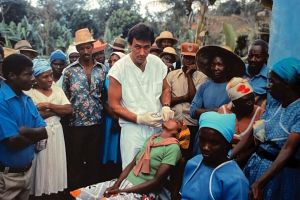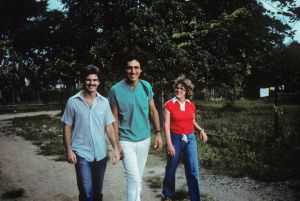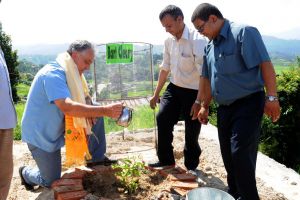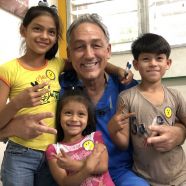How a Decision I Made Forty-Three Years Ago Changed My Life
The year was 1980, between my junior and senior year in dental school at the University of North Carolina in Chapel Hill, North Carolina, and I had to choose between a dental internship in the mountains of North Carolina or in the mountains of Honduras. The only time I had been out of the state was to go to Florida on my honeymoon with Cindy, four years earlier. I chose Honduras. Little did I know how that decision would set me on track for a life of travel and service.
So, with one other dental student and a professor, I was off for six weeks in Honduras, with no telephone, before the days of the internet. We practiced pro bono dental care in remote mountain villages, doing extractions, cleanings, and a few fillings, in the open air under mango trees, using the bare essential equipment. The people were very appreciative as we tried to communicate with the little Spanish we had learned. We had an interpreter, Felipe Rosa, who was in the Honduras military and a graduate of West Point. In exchange for his services, we did dentistry on the base for several days.
My first patient was a little boy of six years old named José. He showed up alone, greeted us with a smile showing all of his decayed teeth, and said, “Sácame todos los dientes,” take out all my teeth for me. He had been living in pain and was happy we obliged. I removed the upper teeth that day and he showed up the next day with another big smile. We removed the lower teeth that day and he returned each day we were in that village to watch and be the inquisitive young boy he was. Even Felipe marveled at the boy’s courage and lack of fear of the dentist.
The purpose of the internship was to improve my dental surgical skills, which I did in extracting more than a thousand teeth! However, I left with much more than that. I was welcomed by wonderful Honduran host families, who provided us with a room and meals while their children helped us learn simple Spanish. Even though we ate well, I returned home in baggy clothes. I saw and learned about another culture in a rural setting, an opportunity one doesn’t often get when traveling. The experience not only opened my heart and mind to unfamiliar foreign cultures but also helped me to come to a better understanding of myself. It led to my desire for more travel, more dental missions, and, eventually to become a Rotarian with a goal of doing good in the world.
Four years later, having set up my general dental practice in Oxford, North Carolina, a member of the Rotary Club of Oxford told me they were looking for a dentist to go on a medical and dental mission trip to Haiti. I didn’t hesitate. “When are we leaving?” The trip to Haiti lasted two weeks, long enough to give me a taste of another culture and make me want to improve my French-language skills. I didn’t do as much dentistry as I had done in Honduras, however I returned home having learned something about service to others and giving back. At the end of the trip, I was speaking with the director of L’Hôpital St. Croix and mentioned to him that I would have liked to have done more dentistry and helped more people. His words to me were, “It is not how much dentistry you did that matters, it is the fact that you took your personal time to travel and help a few people in our country and we appreciate all you have done.”
One memory that stands out during our mission to Haiti was when we were traveling to a small village and our four-wheel-drive vehicle had a flat tire. We were late getting to the village and as we approached, we saw many people running away from us, toward the village. The driver said they thought we were not coming and decided to leave. When they saw our vehicle, they immediately returned, still holding their torn piece of paper with a number on it. Once we set up the clinic under the banana trees, we called out numbers and began treating the villagers until the last number was called. I also had the pleasure of teaching a surgeon from Oxford, who had accompanied me on the trip, how to extract teeth, so he could help treat all those who showed up in the course of that day.

Bart in Haiti 1983
Two years later I would become a Rotarian myself. After joining the Rotary Club of Oxford in 1986, I returned to Haiti several more times with the Rotary Club of East Chapel Hill, and also went to the Dominican Republic, with my own Oxford club members. We did more dentistry and served more people, and my thirst to learn about other cultures continued to grow. For many years that followed, I joined the East Chapel Hill Rotary Club dental-medical brigade to Honduras, Nicaragua, Costa Rica, and Guatemala. Working with Rotarians in those countries facilitated the process and also gave us a sense of security, as the US government usually posted security warnings to those visiting these countries.
Many friendships were made with Rotarians in those countries, among our own Rotarians as well as with local dental students who helped in the clinics. The dental students appreciated the opportunity to have “chair time” and learn from American-trained dentists. As we returned to the same country multiple times, we were able to see the progress made. In Honduras, we went to the same school in Medina multiple years. There, we added rooms for clinics, built a covered courtyard, and provided equipment. Each patient went through dental education prior to being treated and was given a dental hygiene kit. To calm the children, I would perform some simple magic tricks. This eased the children’s anxiety and also made it easier for them to come back for more badly needed dental care. On our return visits year after year, we had patients asking to see the same dentist. “The one who did the magic tricks,” was a popular request among the children.

Bart and Steve walk to clinic
Having worked with the same dental students for several years, friendships grew. In 2016 my wife Cindy and I returned to San Pedro Sula, Honduras, to attend the wedding of a Honduran dental student. Two nights before the wedding, we dined with three other dental students. During our conversations, I mentioned my first trip to Honduras in 1980 and how I always wondered what had become of our Honduran interpreter, Felipe Rosa. The girlfriend of one of the students, Pablo, now a dentist, said, “I have an uncle named Felipe Rosa.” I asked if his parents had owned Rosa Construction Company, and she said yes. The next evening, thirty-six years later, we were reunited with Felipe Rosa, had dinner together, and shared some good stories, including the bravery of little José.
Every dental-medical brigade produced more stories, like little José’s, while building stronger relationships between Rotarians and non-Rotarian members of the team. We traveled together, worked together, and dined together under the Rotary motto, “Service Above Self.” Not having to deal with insurance, fees, or other paperwork allowed us to simply provide much needed treatment and do good in that community. Many times, Rotarian dentists would bring their own assistants and hygienists. For me and my assistant, treating the younger children and watching them walk away with a smile brought much satisfaction. Our assistants and hygienists also benefited from the brigades by experiencing a new culture and another part of the world and returning with a better appreciation of what they have at home.
With each Rotary dental mission, my involvement in Rotary grew, both in the club and on the district level. After my year as district governor in 1999, I was asked by a Rotarian to be on the board of directors for Goodwill Industries of Eastern North Carolina. As a board member, I was given the opportunity to visit and help implement humanitarian projects in Nepal, Columbia, Ethiopia, Mozambique, South Africa, the Philippines, Malaysia, and Cambodia. In several of these countries we also worked with local Rotarians to accomplish our missions. A notable project we did in the municipality of Banepa, Nepal, was to build the Reiyukai Eiko Masunaga Eye Hospital under the guidance of Rotarian Ashok Shrestha, a member of the Rotary Club of Dhulikhel. To this day, we stay in touch and occasionally see each other at Rotary International Conventions. The Eye Hospital still stands, even after multiple earthquakes, and the people no longer have to travel for days to Kathmandu for treatment.

Bart at the Reiyukai Masunaga Eye Hospital
Rotary continues to provide me the opportunity to meet people from other countries, even without traveling. My wife Cindy and I have hosted Youth Exchange Students, Group Study Exchange members, and Rotary Peace Fellows from numerous countries. Each encounter affords us the chance to learn about their culture, their government, and their customs. Even though we are different in many ways, we all share the common desire to live in a safe place and provide for our families. Today, social media makes it much easier to stay in touch with friends and I don’t have to wonder what happened to someone I befriended thirty-six years ago. I don’t look anymore at a person from another country as a stranger, but as someone to get to know and understand where they come from. The sound of a different accent piques my interest.
The COVID-19 pandemic brought the dental mission trips to a halt. However, with things back to “normal,” I am in the process of looking for my next adventure. Presently, we are hosting a Rotary Peace Fellow and his family from Afghanistan. Watching his two young girls grow and learn English has been remarkable, as they are now correcting their mother and father. I only wish I had learned another language at their age.
In recognition of the service I have given through Rotary, I had the honor of receiving the Rotary Distinguished Service Award this year, one of only twenty-two Rotarians to receive it worldwide. The Distinguished Service Award is the Rotary Foundation’s highest service recognition and is given to Rotarians who have demonstrated exemplary service to the Foundation. I was humbled by the gesture of my fellow Rotarians and can only hope to continue on the same path as long as I live. I continue today to practice dentistry and engage in Rotary because both still bring me joy. My passion for both still burns, and they provide me with pockets of peace and hope in the future. And to think that all this followed from a decision I made forty-three years ago: to do an internship in Honduras instead of in my home state!








What a fascinating story! To read how dentistry, which we in the US so often take for granted, ends suffering to those in countries and communities who have zero access to treatment, is eye opening for me, and I come from a family of dentists. Congratulations, Bart. Your award is clearly earned!